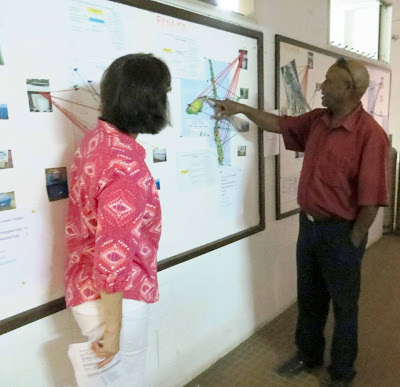 |
| Baby receiving BCG Vaccine © UNICEF Pacific/2013/Allen |
In Port Vila, the capital, One National Ministry of Health took over the French hospital premises, but in 2002 an earthquake badly damaged all the buildings and it was abandoned. Not finding the resources to go anywhere else, the Expanded Programme on Immunisation has moved back into a quite derelict and possibly dangerous set of rooms. Despite the shabby surroundings, with UNICEF-AusAid assistance, the refrigerators are all well stocked with vaccines, and with Japanese aid (JICA), the Ministry has installed an excellent cold room and back up generator. The logistics staff proudly maintain a map with coloured pushpins, showing progress in installation of the solar panels and refrigerators -around 90 so far- in health posts and hospitals. These are called "solar chills", an oxymoron that makes me smile.
A 90 minute propeller flight away, on the island Province of Tanna, I visited the hospital and two clinics. At the hospital, the cold chain is intact, but the EPI programme is not reaching its targets. I interviewed the two staff to know why. Their mobile outreach schedule seems unrealistic at 29 sites per month, in addition to their hours at the hospital. Vehicles are not well maintained and break down frequently. Buying fuel is a big problem. Luckily their next door neighbors the malaria eradication programme, are currently better funded, and help out by giving the vaccinators rides whenever they can. I joke with the staff in programme design documents we call it integration practically it is about hitching a ride! Our monitoring team learns that some refrigerators and freezers donated in the north of Vanuatu (TORBA Province) have not been installed for months, so vaccines cannot be stored nor the plastic water boxes frozen for the outreach workers' boxes.
A 90 minute propeller flight away, on the island Province of Tanna, I visited the hospital and two clinics. At the hospital, the cold chain is intact, but the EPI programme is not reaching its targets. I interviewed the two staff to know why. Their mobile outreach schedule seems unrealistic at 29 sites per month, in addition to their hours at the hospital. Vehicles are not well maintained and break down frequently. Buying fuel is a big problem. Luckily their next door neighbors the malaria eradication programme, are currently better funded, and help out by giving the vaccinators rides whenever they can. I joke with the staff in programme design documents we call it integration practically it is about hitching a ride! Our monitoring team learns that some refrigerators and freezers donated in the north of Vanuatu (TORBA Province) have not been installed for months, so vaccines cannot be stored nor the plastic water boxes frozen for the outreach workers' boxes.
We mark that one for urgent follow up back at MoH in Port Vila. Luckily, we are accompanied on our Tanna monitoring visit by the Secretary-General of the Provincial Government, who is determined to fix everything RIGHT NOW! She is a real dynamo, and by the way, the only female SG. She looks at the broken down hospital vehicles in dismay, and tells the vaccinators, get into my truck, I will take you right now to the outreach site. We follow them up the mountain and find at least 30 women and babies waiting at the closed clinic. The two health workers immediately open up and start a well practiced routine: up goes the weighing scales, pop the babies into the sling one by one, mark their weights on the cards every mother has the card, no growth faltering observed on this visit and then they start the vaccinations and examinations for any needed referrals to the hospital. More programme integration our UNICEf staff checks whether every child has his or her birth registered - there are a few missed ones, whose mothers are strongly encouraged to do that on their next visit down the mountain to town (more on birth registration in another blog). The second clinic we visit is run by the Catholic Church - we check on the solar panels for the refrigerators and note that, likely due to the constant spewing of volcanic dust combined with rain, the frame is rusting and will need replacing. Almost everything wears out fast here. But with this solar power combined with Sister (nun) power, the clinic has regular hours, and is beautifully maintained (we even spot some hand sewn mosquito screens on the windows).
 |
| Map of sites with refrigeration for vaccines. © UNICEF Pacific/2013/Allen |
My overall impression of the Expanded Programme on Immunisation? Good and getting better, parents want the service, staff want to serve... but we have to keep up the monitoring and there is lots of management and organisational work to do in the public health system to achieve the vaccination coverage we need. This is what we call the "software" programming and cannot be neglected after the hardware is in place.

No comments:
Post a Comment